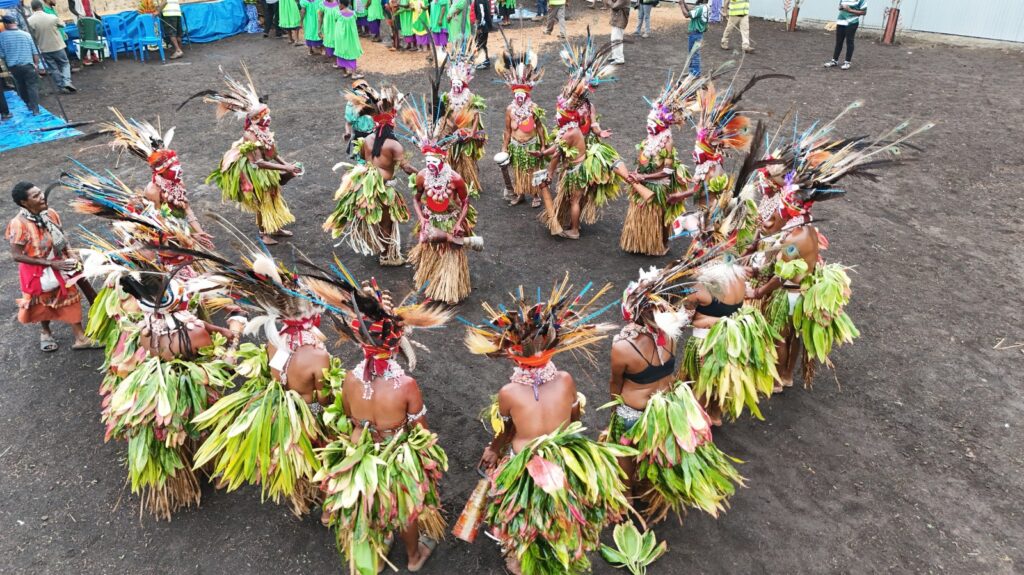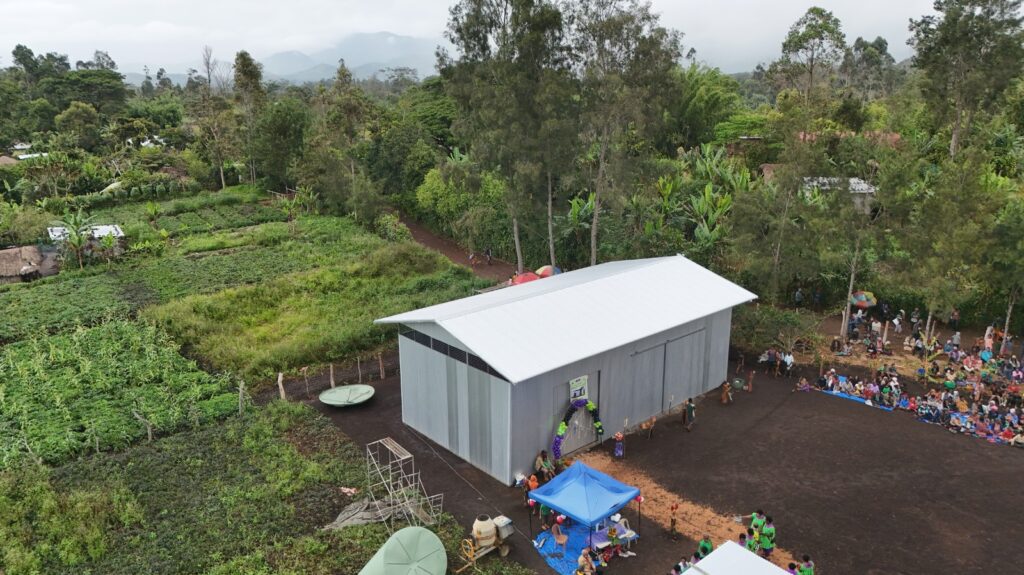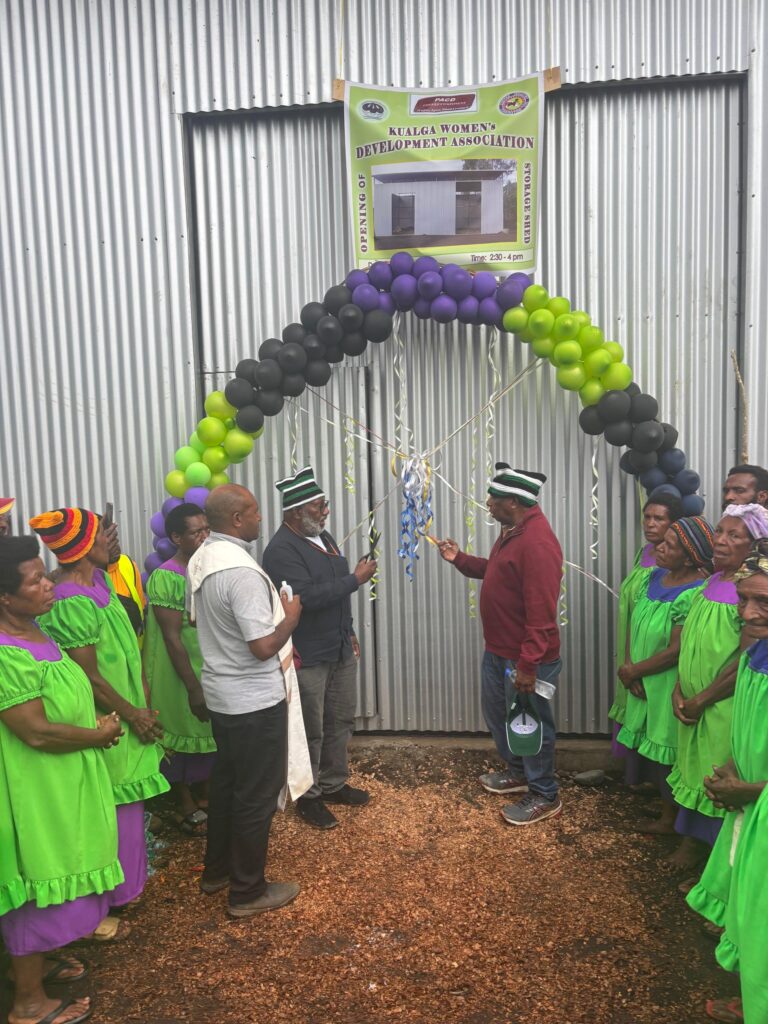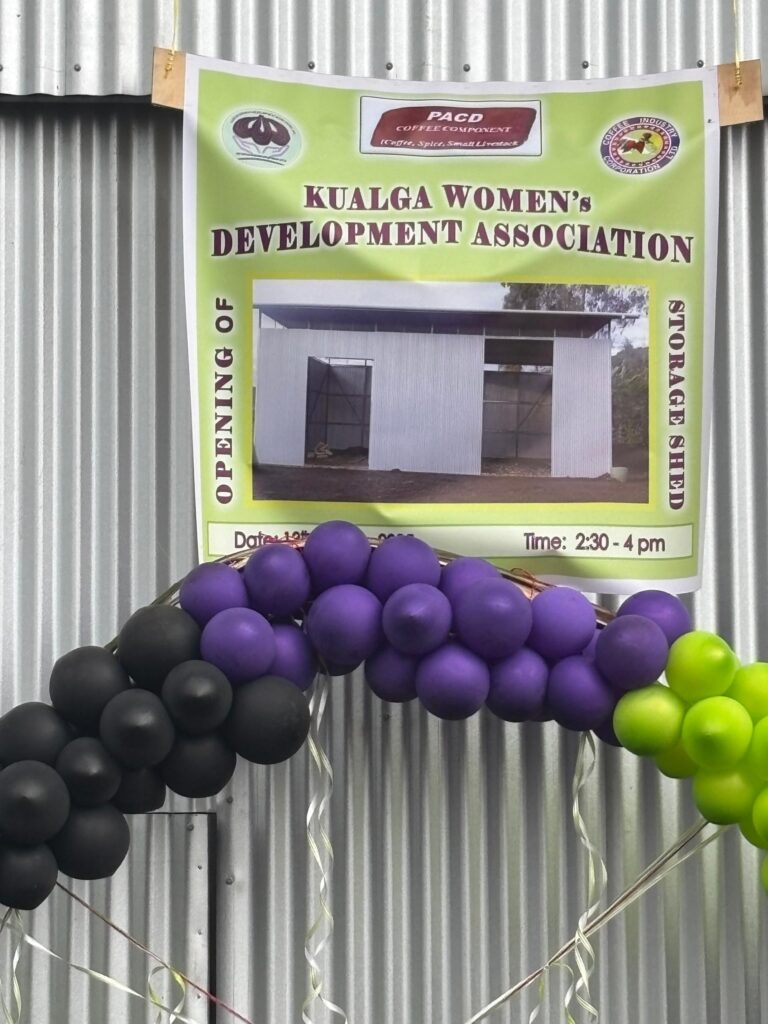Nebilyer Valley, Western Highlands Province, 13 May 2025 –In a powerful testament to the resilience of communities and the transformative power of agriculture, coffee is bringing peace and prosperity to the once-conflicted Nebilyer Valley in Western Highlands Province.
On Tuesday, 13 May 2025, the Ulga and Kulga tribes—long known for their decades of tribal conflict—came together to mark a new chapter in their shared history. The community, through the leadership of the Kualga Women’s Development Association (KWDA), officially opened a new coffee storage shed. The shed and various other projects, valued at K650,000, are implemented by the Coffee Industry Corporation Ltd (CICL)/Papua New Guinea Agriculture Commercialization and Diversification (PACD) Project, with funding from the Government of Papua New Guinea and the World Bank.
The milestone, witnessed by World Bank officials, symbolises a community not only embracing peace but investing in a sustainable, prosperous future.
From battleground to bridge of peace
The Nebilyer Valley is no stranger to conflict. The world-renowned documentaries Joe Leahy’s Neighbours and Black Harvest vividly capture the violence, tension, and complexity of the Nebilyer tribal fights during the 1980s and 1990s. These films told the story of the late Joe Leahy, a coffee planter of mixed European and Highland ancestry, who dedicated his life to bridging two worlds—those of his Western business acumen and the traditional societies of the Ulga and Kulga people. Despite his efforts to use coffee as a vehicle for peace and progress, the valley remained trapped in cycles of violence, land disputes, and mistrust.
Today, the community is finally realising that vision.
PACD Coffee Manager Mr Potaisa Hombunaka described the event as a defining moment not only for the Nebilyer Valley but for the coffee industry in Papua New Guinea.
“For far too long, the Nebilyer Valley was known for tribal warfare that stifled development and divided families,” Mr Hombunaka told the crowd. “Today, coffee has become the bridge—uniting the once-warring Ulga and Kulga tribes and giving them hope, dignity, and a shared purpose.”
He said the project is about more than infrastructure; it is about changing mindsets, transforming rural economies, and empowering Papua New Guineans to take back ownership of the country’s second-highest foreign exchange-earning agriculture commodity—coffee.

A new model for rural economic empowerment
The PACD Project, he noted, is currently working with 250 farming households in the Lower Nebilyer LLG of Tambul Nebilyer District. Already, 25,000 coffee seedlings have been distributed and planted, and the newly constructed central storage and resource centre will serve as a hub for processing and aggregating coffee for local and international markets.
Mr Hombunaka stressed that the long-term vision is clear—return the coffee industry’s value to the hands of local people.

“For too long, 10% of foreign exporters have controlled 80% of PNG’s coffee exports, while 90% of our local exporters handle just 20%. This imbalance must change—and change has started right here in Nebilyer,” he said. “Soon, communities like this will be able to export their coffee directly from their villages, keeping the profits at home and transforming their livelihoods.”
He also highlighted the project’s investment in young graduates entering the coffee industry, ensuring a sustainable and resilient future for PNG’s coffee sector.
World Bank praises women’s leadership and peacebuilding
World Bank PACD Team Leader Mr Allan Oliver said he was deeply moved by the transformation he witnessed in Nebilyer Valley.
“This is more than a project—it is a powerful story of reconciliation, peace, and the leadership of women,” Mr Oliver said. “What you have done here is extraordinary. You have shown that coffee is not just an economic crop—it is a peace crop.”
Mr Oliver praised the leadership of Lead Partner Cecilia Kauga and the KWDA for showing how women can lead change, innovation, and reconciliation, even in the most fragile and conflict-affected areas.


“When women are empowered, they bring peace, prosperity, and innovation,” he said. “But I also want to commend the men of the community who supported and recognised the leadership of the women.”
He reminded the community that the infrastructure now belongs to them, and the responsibility to grow the business, create jobs, and lift the community forward lies firmly in their hands.
A beacon of hope for PNG’s fragile regions
Papua New Guinea is classified by the World Bank as a fragile and conflict-affected country. Mr Oliver noted that the success of the Nebilyer coffee project demonstrates how agriculture, and particularly coffee, can play a critical role in building peace, promoting gender inclusion, and driving local economic development.
“The Nebilyer Valley can now serve as an example for other parts of PNG and the Pacific,” he said. “If we return in a few years, I hope to see this place transformed—a thriving community, children in school, and families prospering, all built on the foundation of coffee.”
The event concluded with a blessing of the new facility, witnessed by hundreds of villagers, leaders, coffee farmers, and supporters. The ceremony was rich with singsing, cultural performances, and heartfelt emotions, marking a day the community will long remember.
With coffee now serving as a symbol of peace and progress, Nebilyer Valley is rewriting its story—a story of resilience, reconciliation, and the promise of a better tomorrow.
###